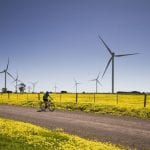Feed aggregator
Queensland budget delivers $250 million to kick-start CleanCo
 The Queensland budget has delivered funding for investments in state-owned renewables and an expansion of the state's hydrogen export capabilities.
The Queensland budget has delivered funding for investments in state-owned renewables and an expansion of the state's hydrogen export capabilities.
The post Queensland budget delivers $250 million to kick-start CleanCo appeared first on RenewEconomy.
Climate change: UK government to commit to 2050 target
Cheap solar and wind can re-boot Australia’s economic advantage
 Cheap wind and solar will allow electrication of transport and industry, and re-boot Australia's competitive advantage in manufacturing, steel and aluminium.
Cheap wind and solar will allow electrication of transport and industry, and re-boot Australia's competitive advantage in manufacturing, steel and aluminium.
The post Cheap solar and wind can re-boot Australia’s economic advantage appeared first on RenewEconomy.
The man who helped feed the world
Baby long-eared owl Rusty learns to fly at botanic garden
CP Daily: Tuesday June 11, 2019
Darwin’s finches sing out-of-tune call after parasites deform beaks
Concern over mating as malformed beaks and nostrils lead to ‘subpar songs’ - study
Tree finches made famous by Charles Darwin’s visit to the Galapagos islands in the 19th century have gone out of tune because of parasitic infections that damage the birds’ beaks and nostrils.
Researchers found that male finches that picked up the fly parasite had malformed beaks and enlarged nostrils that led to “subpar songs”, making it harder for the birds to find mates and reproduce.
Continue reading...UK to set legal course for net zero 2050 emissions
Why is so much of the US under water?
ICE hires manager for North American environmental markets
LCFS Market: California prices rising as large players ramp up activity
EU Market: EUAs dip below €25 as drop in energy complex weighs
Theresa May commits to net zero UK carbon emissions by 2050
UK to put down legislation but Greenpeace warns of impact on developing nations
Theresa May has sought to cement some legacy in the weeks before she steps down as prime minister by enshrining in law a commitment to reach net zero carbon emissions by 2050, making Britain the first major economy to do so.
The commitment, to be made in an amendment to the Climate Change Act laid in parliament on Wednesday, would make the UK the first member of the G7 group of industrialised nations to legislate for net zero emissions, Downing Street said.
Continue reading...Not everyone cares about climate change, but reproach won't change their minds
Exelon forced to buy Massachusetts GWSA allowances to cover obligations, report shows
Manitoba sets out five-year GHG target for provincial climate policies
Problem in the bagging area: the plastic-shaming scheme that went very, very wrong
Tired of people failing to bring in their own carrier bags, a Canadian store brought in a set with ‘embarrassing’ logos. There was just one problem
Name: Plastic shaming.
Age: Brand new in its current form.
Continue reading...Who’s to blame for the plight of hen harriers? | Letters
The “brood management” scheme that is to be trialled on hen harriers nesting on grouse moors is not a serious conservation action but a measure to appease the people responsible for the hen harriers’ plight (Trial to take hen harrier chicks from nests splits bird experts, 7 June). The parlous state of the hen harrier population in England is entirely due to illegal persecution by grouse moor managers, and changing the species’ fortunes simply requires this persecution to stop.
I would take serious issue with the suggestion that what is being proposed is in any way equivalent to the captive rearing of curlew chicks from nests established next to runways on Ministry of Defence airfields. While the curlew chicks are at risk from lawful activities of the MoD, the only threat the hen harrier chicks are being protected from is criminal acts by gamekeepers.
Jonathan Wallace
Newcastle upon Tyne
Atmospheric carbon levels are leaping. We can't afford more years like this
Each year of high emissions adds to the stock of carbon in the air, bringing us closer to catastrophe
One of the many ironies of the climate crisis is that as temperatures change and extreme weather becomes more common, we need more energy to maintain comfort. Hotter summers have driven an increase in power-hungry air conditioning and cooler temperatures in some places – which may be driven by the melting Arctic – raise demand for heating.
BP’s report that carbon emissions from energy use have risen at the fastest rate in nearly a decade reflects those forces, as well as continuing demand from a rising global population and expanding industries.
Continue reading...


